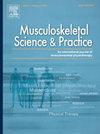英国物理治疗师对为大转子痛综合征(GTPS)患者提供面对面和虚拟康复治疗的看法:横断面调查。
IF 2.2
3区 医学
Q1 REHABILITATION
引用次数: 0
摘要
背景:大转子疼痛综合征(GTPS)是导致髋关节外侧疼痛的一个普遍且令人衰弱的原因。物理治疗师通常会给患者开一些运动处方,并教育他们自我管理的策略。自 COVID-19 以来,虚拟咨询的数量有所增加。通过虚拟方式对 GTPS 患者进行康复治疗可为患者和医疗服务提供者带来益处:了解物理治疗师对通过虚拟方式为 GTPS 患者提供康复治疗的有效性认知:设计:横断面调查:方法: 通过 Twitter(现在为 X)发布一项基于互联网的调查。调查内容包括参与者特征和 5 分制李克特量表,用于评定每种咨询方法对 GTPS 治疗的效果(分数越高效果越好)。通过计算描述性和推论性统计来比较不同咨询类型的有效性:54名物理治疗师做出了回应。总体而言,物理治疗师认为,与虚拟咨询相比,面对面咨询更有效,中位数分别为 5(IQR 4-5)和 3(IQR 2-4)(P 结论:物理治疗师对自己的评价是 "更有效":物理治疗师认为,在康复的几乎所有方面,面对面治疗 GTPS 患者比虚拟治疗更有效。然而,虚拟咨询在自我管理支持以及运动和教育的特定方面仍然得分较高。本文章由计算机程序翻译,如有差异,请以英文原文为准。
UK physiotherapists’ perceptions on providing face-to-face and virtual rehabilitation for patients with Greater Trochanteric Pain Syndrome (GTPS): A cross-sectional survey
Background
Greater Trochanteric Pain Syndrome (GTPS) is a prevalent and debilitating cause of lateral hip pain. Physiotherapists often prescribe exercises and educate patients on self-management strategies. Virtual consultations have increased since COVID-19. Rehabilitating patients with GTPS virtually may offer benefits to patients and healthcare providers.
Objectives
Understand physiotherapists' perceived effectiveness of providing rehabilitation for people with GTPS virtually compared to face-to-face.
Design
Cross-sectional survey.
Methods
An internet-based survey was distributed via Twitter (now X). The survey included participant characteristics and 5-point Likert scales to rate the perceived effectiveness (higher score is more effective) of each consult method to deliver treatments for GTPS. Descriptive and inferential statistics were calculated to compare effectiveness between consultation types.
Results
54 physiotherapists responded. Overall, physiotherapists felt they were more effective at managing patients face-to-face compared to virtually with median scores of 5 (IQR 4–5) to 3 (IQR 2–4) respectively (P < 0.001). Physiotherapists rated themselves more effective at delivering exercise interventions and most educational components face-to-face compared to virtually. Coaching exercises and checking exercise technique received the lowest rating with virtual consults. Higher levels of post-graduate education and confidence in technology were associated with higher perceptions of virtual consults (P < 0.05). There has been a significant increase in virtual practice since COVID-19 (P < 0.001), despite few physiotherapists receiving training.
Conclusion
Physiotherapists rated themselves as more effective in treating patients with GTPS face-to-face compared to virtually in almost all aspects of rehabilitation. However, virtual consultations still scored highly in self-management support and specific aspects of exercise and education.
求助全文
通过发布文献求助,成功后即可免费获取论文全文。
去求助
来源期刊

Musculoskeletal Science and Practice
Health Professions-Physical Therapy, Sports Therapy and Rehabilitation
CiteScore
4.10
自引率
8.70%
发文量
152
审稿时长
48 days
期刊介绍:
Musculoskeletal Science & Practice, international journal of musculoskeletal physiotherapy, is a peer-reviewed international journal (previously Manual Therapy), publishing high quality original research, review and Masterclass articles that contribute to improving the clinical understanding of appropriate care processes for musculoskeletal disorders. The journal publishes articles that influence or add to the body of evidence on diagnostic and therapeutic processes, patient centered care, guidelines for musculoskeletal therapeutics and theoretical models that support developments in assessment, diagnosis, clinical reasoning and interventions.
 求助内容:
求助内容: 应助结果提醒方式:
应助结果提醒方式:


